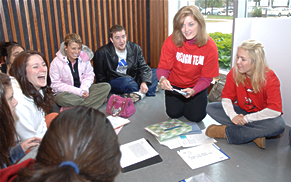"Ways of Knowing" Is Also a New Way of Teaching and Learning
An innovative course in the Faculty of Arts and Social Sciences, offered for the first time in Fall 2005, is already attracting attention from other universities in Canada. Ways of Knowing is developing a reputation for its unique structure: a class of 200 attends guest lectures drawn from across the university, then breaks into small working groups of 10 mentored by senior students.
"The students get the benefits of hearing top experts from many disciplines, and the experience of being in a small class," says professor Jill Singleton-Jackson, who is teaching the course. "It’s a completely new approach and very exciting."

Dr. Jill Singleton-Jackson ("Design Team")
leads a break-out group during a Ways of
Knowing class.
The course was developed over an 18-month period by a committee that included drama professor Tina Ruggirello and sociology & anthropology professors Veronika Mogyorody and Alan Sears, (who has since left the university), as well as Ralph Johnson, Philosophy and Susan Gold-Smith, Visual Arts (currently on sabbatical). It is restricted to first-year arts and social science students and is intended to introduce them to the range of learning at the university, as well as imparting specific skill sets in research, note-taking, and creative and critical thinking.
"We want students to develop as critical thinkers who can take diverse pieces of information and assemble them," says Dr. Singleton-Jackson, "And give them the opportunity to engage with the university."
Recognizing that small groups are more conducive to that engagement, the course designers developed the concept of the "break-out" group, which teams a working group of 10 students with a senior student mentor. The mentors are enrolled in a sister course, the fourth-year level Mentorship and Learning, taught by Prof. Ruggirello.
"We want students to develop as critical thinkers who can take diverse pieces of information and assemble them."
Dr. Singleton-Jackson
The course provides its students with an exploration of both the theory and practice of mentorship. Regular meetings with their charges gives them experience with leadership and organization — with their role strictly defined as helping and assisting.
Singleton-Jackson calls pairing guest appearances by the university’s top lecturers in their fields with mentoring by senior students "inspired."
"We’ll be bringing in experts from all over the campus, from biology to the arts, and having them discuss how their disciplines attempt to understand the future — which is the theme for this year," she says. "We can do that, but then the question arises: Where do we get all these mentors? Fortunately, we have an incredible group of mentors this year, and I feel positive that with the student body at University of Windsor, we will be able to continue to recruit committed, high-quality mentors."
It’s an approach that is generating some buzz among educators across Canada, says Dr. Mogyorody.
"There is quite a bit of interest from other universities about this course," she says. "When I go to conferences, I’m getting inquiries about its unique approach from many of my colleagues."
"We’ll be bringing in experts from all over the campus, from biology to the arts, and having them discuss how their disciplines attempt to understand the future"
Dr. Singleton-Jackson
The broad theme of the future has led to discussions ranging from the evolving nature of language to the technology and ethics of cloning. Their considerations of the future will lead to the students’ final project: the groups will devise a graphic representation of their vision of a place or space, projected into the future. The projects will be displayed in the CAW Student Centre on December 2.
The creative and collaborative nature of the final project marks another innovation for the course.
"Typically when you write a paper, you turn it in and it’s over," says Singleton-Jackson. "The fact that these will go on public display will increase the students' pride in their projects. It’s my hope this will help them to see this as one of the many differences in this course."
Kevin Johnson is the editor of the U of W Daily News


 Print
Print